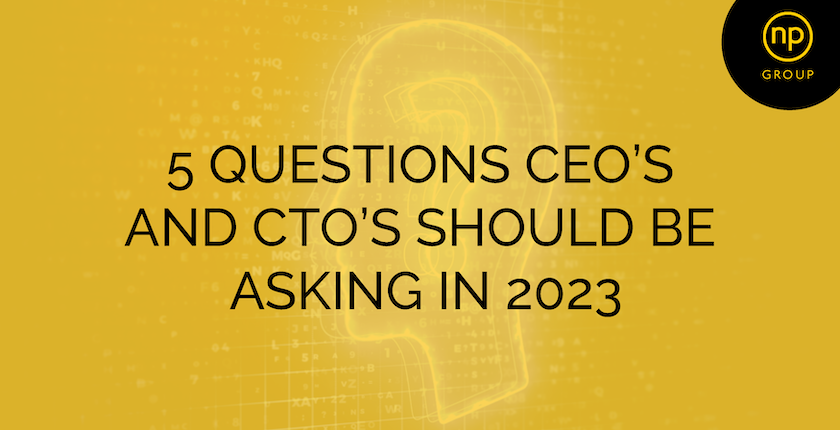5 Questions CTOs and CEOs should be asking in 2023
At the beginning of 2022 many CEOs and technology leaders were expecting to capitalise on the digital opportunities of the previous two years. However, businesses are now staring the threat of global recession in the face and managing the ripple effects of inflation, supply chain issues and a growing talent gap. Whilst the future may seem uncertain, good strategic planning and a commitment to your goals can help your business weather the bad times and emerge stronger and better able to succeed when the tide turns.
To do so, it’s critical that we as tech and business leaders ask ourselves several crucial questions; what are our long-term business goals and how can tech support them? Are we focussed on cost-efficiency? Is our goal to bolster growth and improve margins? Or is our overall business model changing?
As 2023 approaches, it’s time to think about what’s to come, what trends are emerging in technology and how you can leverage them to stay ahead of competitors.
Here are five questions CTOs and CEOs should consider for 2023:
1. Can automation help your business be more agile?
Building automation into different areas of your organisation has many benefits. Used correctly, automation can increase the resilience of products and services, make your workforce more efficient and provide a better service for your consumers. Adaptive AI and data analysis tools will also ensure you’re able to respond quickly to challenges in your supply chain and adjust to changing consumer behaviour as agilely as possible.
Tech leaders should consider adopting automation tools and software in areas such as sales, marketing, accounting, HR and IT. One thing to be aware of, however, is that automation and AI will require new risk management strategies to keep your business secure.
2. Which new technology implementations will best drive growth?
Choosing which new technology implementations you should prioritise for 2023 can be challenging. However, there are three emerging technologies set to drive business growth in the coming year. They are:
Industry-specific cloud platforms – Traditionally cloud services have been generic solutions used by businesses across many different industries. Increased specialisation will help businesses choose solutions that solve their unique challenges through customisable, industry-relevant cloud products. As a result, 50% of enterprises will use industry cloud platforms to accelerate their business initiatives by 2027.
Superapps – Since 90% of users now access the internet via mobile devices, there has been an explosion of mobile apps for everything from shopping to banking to socialising. Superapps allow companies to combine apps into a single platform, increasing the time consumers spend and the amount of revenue to be gained from increased data.
Wireless-value realisation – The UK is continuing its 5G rollout and an increasing number of network devices are taking advantage of improving wireless technology. Being able to successfully integrate multiple wireless services will be key for digital businesses. Wireless-value realisation will ensure wireless tech is a cost-efficient, scalable, and reliable strategy.
3. Are you prioritising technological investments based on sustainability?
Sustainability is the next big focus for CEOs developing ambitious Environmental, Social & Governance (ESG) targets. Technology leaders will play a key part in ensuring businesses meet those goals and in ensuring the sustainability of organisations over time. 33% of CIOs are struggling with making their legacy systems more sustainable which is why developing transformation projects with sustainability in mind and choosing sustainable products is critical. Tech leaders should integrate sustainability into their long-term IT roadmap.
4. Is your resourcing strategy fit for the future?
Ambitious cloud transformation projects or automation integrations are impossible without skilled and experienced staff to design, build, implement and manage them. The tech industry is facing a deepening talent shortage with 70% of organisations saying they have had trouble hiring the tech skills they need.
Tech leaders must build innovative hiring strategies into their wider resourcing strategy if they want to be able to attract and retain talent. Developing employer branding best practice will help reduce turnover and make it easier to reach qualified candidates.
5. Do you have a retention strategy?
Is 2023 the year to look at implementing a talent retention programme? There is a war for tech talent and the best way to make sure you keep your best people is to create a set of practices and policies to ensure that your top performers remain with you. With that, it is possible to build a great competitive differential. Employer Branding and On-boarding programmes are great examples of this and will ultimately lead to saving money on recruitment and training in the future.
Whatever your technology plans for 2023, we can help make them a reality
The future might feel uncertain but 2023 has the potential for innovation and growth. Whatever your plans for the coming year, NP Group can help you find the talent you need to take your organisation into the future. Get in touch today.
About NP Group
At NP Group we challenge the status quo of the global talent market. We provide bold solutions, creative approaches and, above all, collaboration. We don’t believe in transactional recruitment relationships, focusing on forging close partnerships with all our clients.
Our consultants are highly knowledgeable in the industry sectors and technologies they serve and provide a consultative, advisory service tailored to you.
If you are looking for recruitment advise or to hire the best Technology talent, contact us.
e: info@groupnp.com
t: +44207 953 0000
w: www.groupnp.com

